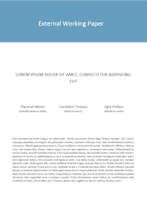Conditional Empirical Likelihood with Auxiliary Moment Restrictions. Ashish Patel and Richard J. Smith, (Preliminary)
The paper consider models where the parameter of interest is described by one set of conditional moment restrictions and there exists another set of conditional moment restrictions with unknown nuisance parameters. A leading example is the study of conditional treatment effects; one set of moment restrictions describe a treatment effects model and another set describes the propensity score. This paper introduces two-step conditional empirical likelihood-weighted estimation of the parameter of interest. The estimator gives guaranteed efficiency gains over just using the identifying moment restrictions. To achieve this, moment restrictions may need to be adjusted to account for first-stage nuisance estimation of plug-in components (Chernozhukov, V., J.C. Escanciano, H. Ichimura and W.K. Newey (2016): “Locally Robust Semiparametric Estimation”, Cemmap working paper CWP31/16). When auxiliary restrictions require no nuisance estimation, the estimator is asymptotically efficient. This generalises existing the approach of F. Bravo (2010) “Efficient M-Estimators with Auxiliary Information”, Journal of Statistical Planning and Inference, to the conditional moments setting.

